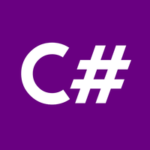A delegate is declared by using the keyword delegate, otherwise it resembles a method declaration.
- delegate int delegateAdd (int x);
Instantiation:
To create a delegate instance, we need to assign a method (which has same signature as delegate) to delegate.
- static int Add (int x,int y)
- {
- return x+y;
- }
- ..
- //create delegate instance
- delegateAdd objAdd= new delegateAdd (Add);
- //short hand for above statement
- delegateAdd objAdd=Add;
Invocation:
Invoking a delegate is like as invoking a regular method.
- // Invoke delegate to call method
- int result = objAdd.Invoke (3,6);
- //short hand for above statement
- int result = objAdd (3,6);
Plug-in Methods with Delegates
A method can be assigned to a delegate instance dynamically. This is useful for writing plug-in methods.In below example, The SquareData method has a delegate parameter, for specifying a plug-in SquareData.
- public delegate int delegateSquare(int x);
- class Util
- {
- public static void SquareData(int[] arr, delegateSquare obj)
- {
- for (int i = 0; i < arr.Length; i++)
- arr[i] = obj(arr[i]);
- }
- }
- class demo
- {
- static void Main()
- {
- int[] arr = { 1, 2, 3 };
- Util.SquareData(arr, Square); // Dynamically hook in Square
- foreach (int i in arr)
- Console.Write(i + ” “); // 1 4 9
- }
- static int Square(int x)
- {
- return x * x;
- }
- }
Types of Delegates
Single cast Delegate
A single cast delegate holds the reference of only single method. Above created delegate are single cast delegate.
Multi cast Delegate
A delegate which holds the reference of more than one method is called multi cast delegate. A multicast delegate only contains the reference of methods which return type is void. The + and += operators are used to combine delegate instances.
- MyDelegate d = Method1;
- d = d + Method2;
- //short hand for above statement
- d += Method2;
Now, Invoking d will call both methods – Method1 and Method2. Methods are invoked in the order in which they are added.
The – and -= operators are used to remove a method from the delegate instances.
- d -= Method1;
Now, Invoking d will invoke only Method2.
Multicast delegate example
- delegate void Delegate_Multicast(int x, int y);
- class demo
- {
- static void Method1(int x, int y)
- {
- int z=x+y;
- Console.WriteLine(“Method1 is called”);
- Console.WriteLine(“\n Sum is : {0}”,z);
- }
- static void Method2(int x, int y)
- {
- int z=x+y;
- Console.WriteLine(“\n Method2 is called”);
- Console.WriteLine(“\n Sum is : {0}”,z);
- }
- public static void Main()
- Delegate_Multicast dmulti = Method1;
- dmulti += Method2;
- dmulti(1, 2); // Method1 and Method2 are called
- dmulti -= Method1;
- dmulti(2, 3); // Only Method2 is called
- }
- }
- Output:
- Method1 is called
- Sum is : 3
- Method2 is called
- Sum is : 5





